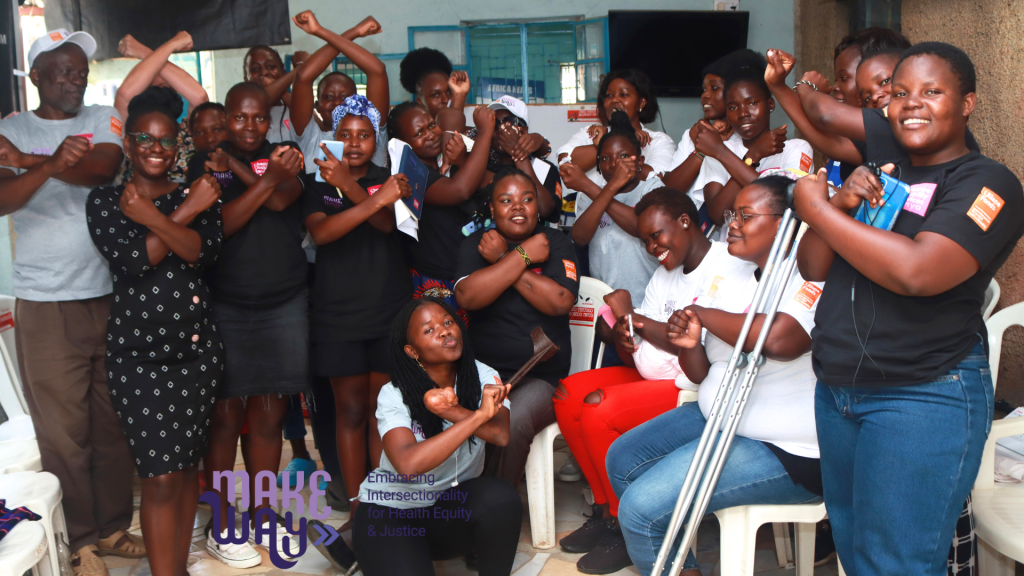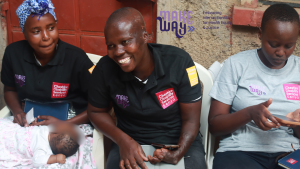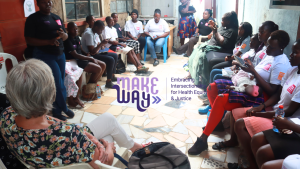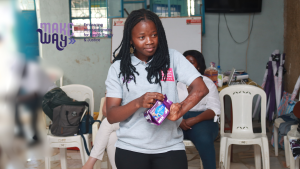Safe spaces for adolescent and young women with disabilities: An avenue for disability inclusion and SRHR advocacy
 13 June 2024
13 June 2024

Adolescent girls and young women with disabilities, in particular, face a myriad of intersecting challenges. These obstacles hinder their access to quality sexual and reproductive health (SRH) services—be it due to inadequate education, economic hardship, insufficient parental support, or the barriers imposed by disability. Despite these hurdles, numerous young women strive to overcome adversity..
 In a world brimming with challenges, some potent enough to plunge us into the depths of mental health struggles, it is essential to find a safe space – a community where we truly belong. A place where our stories and experiences are met with empathy rather than judgment, where prejudice has no foothold. Such a community mirrors the values of our society today, offering solace and understanding in the face of life’s stormy journey.
In a world brimming with challenges, some potent enough to plunge us into the depths of mental health struggles, it is essential to find a safe space – a community where we truly belong. A place where our stories and experiences are met with empathy rather than judgment, where prejudice has no foothold. Such a community mirrors the values of our society today, offering solace and understanding in the face of life’s stormy journey.
According to According to Kenya HIV Prevention and Accountability, a Community Perspective 2023 report, A community perspective, 2023, there is still an intensifying stigma and discrimination towards some key populations and threatening progress made in the delivery of comprehensive sexuality education (CSE) and sexual and reproductive health (SRH) services to young people. Through the safe spaces, these young persons can access information on SRHR, and legal information on referral pathways in case of any violation.
Adolescent girls and young women with disabilities, in particular, face a myriad of intersecting challenges. These obstacles hinder their access to quality sexual and reproductive health (SRH) services—be it due to inadequate education, economic hardship, insufficient parental support, or the barriers imposed by disability. Despite these hurdles, numerous young women strive to overcome adversity and fulfill their potential.
In the informal settlements of Nyallenda Kisumu County, Cheshire Disability Services Kenya established a safe space for adolescent girls and young women with disabilities (AGYWDs) in October 2023, the main aim of this initiative was to create an avenue for these girls to share their lived experiences on SRH, at the same time empowering them to advocate for comprehensive SRH service delivery in the health care centers especially for young persons, with a hope that this will enhance SRH quality service delivery.
This group of 20 young girls, consists of adolescent mothers, young girls, and young mothers with disabilities, who are resilient and ready to learn and shape their communities through SRH advocacy. Drawn from various sub-counties within Kisumu County, these young persons aim to learn, equip, and capacitate themselves with the skills and technicalities of advocating for their SRHR and even HIV/AIDS as a related factor.
In addition to the psychosocial impact, young individuals have the opportunity to engage with experts who provide education on menstrual hygiene, legal justice, and sexual and reproductive health (SRH) services. Each day is dedicated to a specific topic, and the sessions last up to 3 hours.
A cardinal rule lies at the heart of their space: ‘What is shared here, stays here.’ This principle is the bedrock of its status as a safe space, instilling confidence among its members that their disclosures will never breach the virtue of these walls. The necessity for such a space is particularly acute for adolescent girls and young women with disabilities. It’s a place where they convene not just to exchange narratives but to reclaim their agency, honor, and self-worth, and acquire the tools for legal empowerment against any form of gender-based injustice.
Transportation challenges may arise due to the diverse sub-counties the participants hail from. However, the value they place on the knowledge gained from this initiative far outweighs any logistical hurdles. This education is seen as a pivotal, long-term investment. Furthermore, many of the young women are driven by a desire to become catalysts for positive change, aiming to significantly influence the lives of their peers in their communities
Article 43 of the Kenyan Constitution (2010) stipulates that every person has the right to the highest attainable standard of health, which includes the right to healthcare services, including Reproductive Healthcare.
.

Under the National Adolescents Sexual and Reproductive Health Policy 2015 K 2015 in addressing the needs of marginalized and vulnerable adolescents, the policy highlights the need for the provision of disability-friendly SRH, information, and services as well as supporting access to and provision of high-quality and affordable adolescent-friendly SRH services at all level of health service provision.
Through the safe space, the members can conduct peer advocacy on HIV/AIDS as well as harness their collective strength, embarking on a transformative journey towards self-actualization in sexual and reproductive health (SRH) advocacy.
Make Way Programme’s theme is “Embracing intersectionality for health equity and justice” MakeWay.org. Where intersectionality, as coined by civil rights scholar Kimberlé Crenshaw, is an understanding that different sets of social identities like race, class, sexuality, etc. overlap to impact access to rights and opportunities. In this aspect, disability and other compounding vulnerabilities to access better SRHR services. Through the safe spaces, they can understand why the intersectionality concept should be applied in the health systems.
Furthermore, the young persons are some of the youths involved in the concluded Make Way Programme’s Intersectional Community Scorecard (ICSC) here, an accountability tool used by the youths to advocate for accessible available acceptable quality healthcare in the health facilities AAAQ-framework, and getting an opportunity in such spaces build their capacities on improving their advocacy skills for SRHR even beyond the Make Way Programme’s phase.
The safe space has become a beacon of hope and empowerment for young teenage mothers and young women with disabilities. They fondly describe it as a sanctuary—a place where their stories and experiences are met with empathy rather than judgment. It stands as a bastion of learning and personal growth, where these young women and girls can unlock and nurture their talents, with a special emphasis on honing their advocacy skills.



